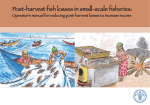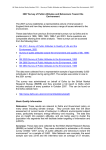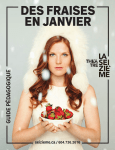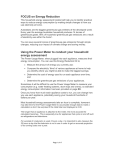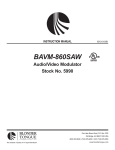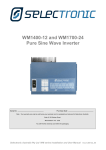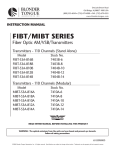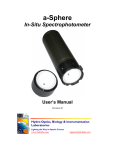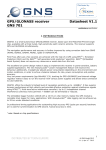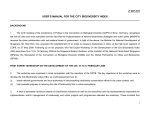Download MSC Ecolabel User Guide - Marine Stewardship Council
Transcript
THE BEST ENVIRONMENTAL CHOICE IN SEAFOOD MSC Ecolabel User Guide January 2013 Ecolabel User Guidelines 2011 2 Heading Contents 1. Introduction 1 2. MSC ecolabel ownership 2 –Ecolabel Licence Agreement –Fees and reporting –Artwork sign-off 3. How to obtain a copy of the MSC ecolabel –Six steps to using the MSC ecolabel 3 4. The MSC ecolabel 4 –Elements of the ecolabel –Formats –Colour –Size –Translations 5. Who can use the MSC ecolabel? 6 6. On-product use 7 –Position –The MSC claim –The MSC Chain of Custody code –Additional requirements –Trade names –Exclusion zone –Multipack rules 7. On-menu use –The oval and full ecolabel with explanatory text –Size and proportions –Other requirements 8. Fish counter use 10 –Price tags –Accompanying material –Use of fish tags 9. Off-product use 9 11 –Promotional material –The MSC ecolabel and supporting text –Font style and colour –Clear space –Other requirements –Supporting text 10.Incorrect and misleading usage 11.Contact us 12 Inside back cover Front cover image: © Léo-Paul Ridet Ecolabel User Guide 2013 1 1. Introduction The Marine Stewardship Council’s fishery certification program and seafood ecolabel recognise and reward sustainable fishing. The distinctive blue ecolabel gives consumers confidence that they are choosing seafood products which are traceable and have been sourced from independently certified fisheries. Before seafood can be sold with the ecolabel, businesses in the supply chain must have undertaken a traceability audit to meet the MSC Chain of Custody standard. Rules governing MSC ecolabel use A range of potential benefits The guide sets out the rules governing the use of the label and explains how different users – fisheries, supply chain organisations, retailers, restaurants, caterers, non-commercial organisations and the media – can ensure that public awareness of the thousands of products the ecolabel appears on around the world continues to grow. As a certification mark and trademark, strict rules govern the display of the MSC ecolabel, both on-product and off-product. It is in the interest of all users to follow this guide, so that the ecolabel retains its integrity and value. Using the MSC ecolabel brings a range of potential benefits to any company in the supply chain, helping it to stand out from competitors and attract new customers. Many of the world’s leading retailers and seafood brands have placed the MSC at the centre of their sustainable seafood policies. The MSC ecolabel is also used by certified fisheries, media organisations and many others to communicate support for the MSC program. The MSC mission The MSC mission is to use our ecolabel and fishery certification program to contribute to the health of the world’s oceans by recognising and rewarding sustainable fishing practices, influencing the choices people make when buying seafood, and working with our partners to transform the seafood market to a sustainable basis. The Marine Stewardship Council is an independent, global, non-profit organisation. © Mars Petcare Image far right: Mars Petcare launched its first MSC labelled Whiskas and Sheba products in Europe made from 100 per cent MSC certified fish off-cuts. © McDonald’s Image right: McDonald’s commitment to source from certified sustainable fisheries means 13 million consumers across 39 countries in Europe can now buy MSC labelled Filet-O-Fish. Ecolabel User Guide 2013 2 2. MSC ecolabel ownership The MSC owns the trademark of the ecolabel, theabbreviation ‘MSC’, and its name ‘Marine Stewardship Council’. The MSC reserves all rights in relation to these trademarks. Only organisations that have signed a formal written agreement with the MSC – the Ecolabel Licence Agreement – may display the MSC ecolabel. The ecolabel cannot be displayed without the prior written consent of the MSC. Permission to display it does not transfer or license any intellectual property rights to others. The ecolabel can only be used after an agreement has been signed. Unauthorised display is prohibited and will be treated as a trademark infringement. The MSC reserves the right to take legal action against any party that reproduces or copies the MSC name without prior authorisation. Ecolabel Licence Agreement This is for displaying the MSC ecolabel on a seafood product or menu item, and associated promotional materials, such as a website. Organisations that sign an Ecolabel Licence Agreement are liable to pay annual fees and, depending on the ecolabel application, royalties. Fees and reporting The MSC will request a completed turnover declaration on a quarterly, twice-yearly or annual basis depending on how much MSC labelled seafood is sold. This information allows the MSC to calculate the annual fees and royalties. More information about how much it costs to use the MSC ecolabel is available at: www.msc.org/get-certified/ecolabel-costs Artwork sign-off Once permission to use the MSC ecolabel has been granted, organisations must submit artwork proofs to the MSC before printing, publishing or displaying the ecolabel. Ecolabel User Guide 2013 3 3. How to obtain a copy of the MSC ecolabel Print-ready artwork files in high resolution must be submitted for the ecolabel requirements to be verified. The MSC ecolabel is only released as part of the approvalprocess set out below. The ecolabel must not be forwarded to any third parties, except designers creating packaging or associated promotional materials. Six steps to using the MSC ecolabel 1. Sign an Ecolabel Licence Agreement with the MSC You can apply for an Ecolabel Licence Agreement by emailing [email protected] 4. Get approval Once design has been agreed, the MSC will send you written approval of the ecolabel use. Only at this stage should you print your materials. Once confirmed, the MSC can provide you with a high-resolution copy of the ecolabel in any of the following formats: JPG, TIFF, AI, EPS, BMP. 5. Send materials to the MSC Once printed, send samples of the MSC labelled materials to the MSC Head Office at Marine House (see back cover for address). 2. Add the MSC ecolabel to materials Incorporate the MSC ecolabel and associated items into the design of your materials, following the guidelines in this document. 6. Product is added to the MSC’s website Once approved, the MSC will promote your product on its website’s “Sustainable seafood product finder” www.msc.org/product-finder. 3. Submit proofs for approval To avoid material needing to be recalled, submit the following before printing or using publicly: –Colour proofs of all materials carrying the MSC ecolabel, preferably in PDF format. If this is packaging please send the final draft design of the entire pack. –A completed approval form, which can also be obtained from [email protected] Please provide a 600 x 600 pixel jpeg image of your product. Correct use of the MSC ecolabel will speed up the approval process. Please ensure that all design agencies and other service providers who work with the MSC ecolabel have a copy of this guide. Ecolabel User Guide 2013 4 4. The MSC ecolabel This section provides a guide to the use of the MSC ecolabel, including information on colour, size and positioning. F A B E C D Elements of the ecolabel The following requirements apply to all uses of the label. Any deviation in colour, font or design will lessen its effectiveness and could result in legal consequences associated with trademark infringements. The MSC ecolabel comprises six elements, which may not be separated from each other or altered in any way. A – ‘Certified sustainable seafood’ This phrase communicates the meaning of the MSC ecolabel. B – MSC initials The letters MSC are the abbreviation of the Marine Stewardship Council, the owner of the ecolabel. C – www.msc.org The MSC’s website address must always be displayed in its whole form, as shown here. D – White keyline The white line which outlines the fish checkmark and the ecolabel as a whole must always be displayed. No other colour may be used. E – TM The ecolabel must be directly accompanied by a ™. The letters TM indicate that this ecolabel is a trademark. Registration of the MSC trademark is already approved in many countries. F – Fish checkmark The oval shape forms the pictorial part of the ecolabel and illustrates a fish body that incorporates a checkmark, or tick. Ecolabel User Guide 2013 5 4. The MSC ecolabel continued Formats The MSC ecolabel is available in two formats: a landscape (horizontal) format and a portrait (vertical) format. Landscape (horizontal) Portrait (vertical) Both formats may be displayed and it is possible for the same user to display one format of the MSC ecolabel on one application and the other format on a different application. Colour Pantone 286 CMYK 100 60 0 2 RGB 0 93 170 Hex #005daa Monotone The MSC ecolabel is also available in black and white for circumstances where the packaging is black and white, or the same Pantone blue. In these instances, the ecolabel must print in solid black and white only, never in grey-scale. These exceptions are agreed at the discretion of the MSC. Minimum size The minimum size for on-product applications of the landscape (horizontal) ecolabel is 10mm (measured from the base to the top of the lefthand side). The minimum size for the portrait (vertical) ecolabel is 14mm (measured from side to side at the top). Minimum size requirements for bulk packaging are 20mm and 28mm, respectively. Maximum size There is no maximum size restriction for display of the MSC ecolabel or its variations, either on-product or off-product. Translations Translations of the phrase ‘certified sustainable seafood’ are already available in over 20 languages. If a new translation is required this must be carried out by the MSC. Minimum size requirements Landscape format On-product: 10mm Bulk packaging: 20mm 10mm Size 14mm Portrait format On-product: 14mm Bulk packaging: 28mm Ecolabel User Guide 2013 6 5. Who can use the MSC ecolabel? Any commercial or non-commercial organisation can apply to use the MSC ecolabel. Foodservice Processors, distributors, foodservice suppliers and wholesalers that sell MSC certified seafood in bulk or in consumer-ready packaging. Please see pages 7-8 for use of the MSC ecolabel on product. Businesses that serve MSC certified seafood that is ‘ready to eat’ and can be consumed immediately, either on the premises or as a take-away. Please see page 9 for use of the MSC ecolabel on menus. Retailers Non-commercial organisations Shops and stores that sell MSC certified third-party branded products and privatelabel products to consumers, including online retailers and fishmongers. For MSC ecolabel use at fish counters please see page 10. For off-product use see page 11. Non-profit and public sector organisations that want to promote their support of the MSC program. Please see page 11 for off-product use of the MSC ecolabel. Certified fisheries Media The fishery client and those represented by the fishery client. Please contact [email protected]. Media organisations that publish news and features about the MSC. Please see www.msc.org. © Bloomberg © J Simpson / MSC © MSC © MSC © Firstpix / MSC © A Estay / MSC Supply chain companies Ecolabel User Guide 2013 7 6. On-product use ‘On-product’ refers to the display of the MSC ecolabel on products to indicate that a seafood item comes from an MSC certified sustainable fishery. This includes bulk packaging, caterers’ pricelists and catalogues used in a business-to-business context. Packaging example Species name Ecolabel on front of packaging Position The MSC ecolabel must appear on the front of the packaging to ensure it is immediately visible to consumers. The MSC claim When the MSC ecolabel is used on product, it must always be accompanied by the MSC claim. The claim explains and substantiates the MSC ecolabel and is available in five versions: Version 1 “Thank you for choosing seafood that has met the MSC’s global standard for sustainability. Together we can help protect fish stocks for the future. www.msc.org” Version 2 “This product comes from a fishery that has been independently certified to the MSC’s standard for a well-managed and sustainable fishery. www.msc.org” Version 3 “The [insert seafood species] in this product comes from a fishery that has been independently certified to the MSC’s standard for a well-managed and sustainable fishery. www.msc.org” Version 4 “This seafood has met the MSC’s global standard for sustainability. www.msc.org” Version 5 “From an MSC certified sustainable fishery. www.msc.org” Translations of the MSC claim are available at www.msc.org/get-certified/ecolabel-claim. The MSC Chain of Custody code Every MSC labelled product carries a unique Chain of Custody code featuring a sequence of letters and numbers that refer to the producer of the product. It shall be displayed next to the MSC ecolabel or MSC claim and should be readable. The MSC Chain of Custody code next to the ecolabel. The MSC claim close to the ecolabel. This code underpins the traceability of the MSC Chain of Custody and ecolabelling program, and it must be displayed to validate use of the MSC ecolabel. The code will be provided by your certifier or supplier, or you can contact the MSC for advice. Ecolabel User Guide 2013 8 6. On-product use continued Additional requirements Apart from showing the correct seafood species, MSC ecolabel, Chain of Custody code and MSC claim there are no other MSC requirements for product labelling. If other information related to a certified fishery or the MSC is mentioned (e.g. FAO region, fishing method), the MSC will check the information according to the certification report issued by the certifier. The MSC is not responsible for validating any additional claims. Clear space must be at least 2mm for product specific text Minimum 5mm clear space for general on-product design elements Images of non-certified species or unassociated fishing activity cannot be displayed on product packaging. The responsibility for adhering to national and international food standards and labelling guidelines rests solely with the owner of the product packaging. Trade names The product name should not refer to noncertified species. Under some circumstances exceptions to this rule may be made on application to the MSC (e.g. ‘Imitation Crab’ for surimi products). The name of the product must not be misrepresentative to buyers or consumers. For information on format, colour and size of the ecolabel please refer to page 5. Exclusion zone When the ecolabel is produced at its minimum size, the clear space around it must be at least 2mm for product-specific text (such as species, weight, ingredients) where the text does not lead to a connection between the MSC and any other organisation. Clear space must be at least 5mm for general packaging design elements (such as brand names, logos etc) where the MSC ecolabel could be associated with the host brand. When the ecolabel is reproduced at larger sizes it must be surrounded by clear space at 10 per cent of the ecolabel height (portrait format) or width (landscape format). Multipack rules The MSC ecolabel may not appear on the outer packaging of a multipack product if one of the individual packs contains non-certified seafood. There is a specific version of the MSC ecolabel – the multipack mark – available on request. A The XXXX (insert seafood species) in this product comes from a fishery that has been independently certified to the MSC’s standard for a well-managed and sustainable fishery. B www.msc.org A–T he multipack mark may be included in the outer packaging but must not appear on the front. B–T he blue oval may be used on the front of the packaging next to the name of the MSC certified product or species. The Chain of Custody code shall be displayed next to the multipack mark on the outer packaging. The individual packs inside must show the standard MSC ecolabel and follow the on-product rules set out in this guide. Ecolabel User Guide 2013 9 7. On-menu use ‘On-menu’ refers to the display of the MSC ecolabel on menus, usually by restaurants or caterers. There is a specific version of the MSC ecolabel available for on-menu use that can be requested from the MSC. A B The oval and full ecolabel with explanatory text A – T he blue oval can be placed next to listed dishes on a menu. The seafood content in each dish indicated must be over 95 per cent MSC certified seafood. B – T he full ecolabel with explanatory text must also be printed on the menu. Size and proportions The full ecolabel is a complete entity and should not be broken up or tilted from its axis. The minimum size of the full ecolabel is 15mm (measured from the base to the top of the left-hand side). © MSC / C Pescod Menu example Neither ecolabel may be redrawn, distorted or altered in any way from the original master artwork. Other requirements The Chain of Custody code of the restaurant or caterer needs to appear next to the full ecolabel. For information on colour of the ecolabel please refer to page 5. Ecolabel User Guide 2013 10 8. Fish counter use Specific rules apply when the MSC ecolabel is used at fresh fish counters in retailers or independent fishmongers. Price tags The MSC ecolabel and the Chain of Custody code of the retailer or independent fishmonger must be applied to all price tags displaying MSC certified fish in one of the following ways: –By printing the ecolabel on price tags –By using clips that are attached to price tags –By using a sticker on price tags –By using fish tags. Accompanying material A poster or display stand needs to be positioned at the fish counter displaying: –The MSC ecolabel –The MSC claim “Seafood with this mark comes from a fishery which has been independently certified to the MSC’s standard for a wellmanaged and sustainable fishery. www.msc.org” – The Chain of Custody code of the retailer or independent fishmonger. The fish tag must be applied to a clearly visible part of the product. The company making the fish tag will also be liable for paying royalty fees to the MSC. As a consumer-facing product, the product can then be sold by a retailer without the retailer needing to have MSC Chain of Custody certification. For information on format, colour and size of the ecolabel please refer to page 5. * Consumer ready and tamper proof: Any item for presentation to the ultimate consumer consisting of a foodstuff and its packaging, where the content cannot be altered without opening or irreversibly changing the packaging. (Adapted from the MSC Certification Requirements) Use of fish tags The company making the fish tags will need to prove to the MSC and its certifier that the tag conforms to the MSC’s definition of consumer ready and tamper proof* packaging. The tag must either be impossible to remove or for single use only. © Kaufland In some instances seafood companies may decide to produce fish products that are identified as MSC certified by using tags, bands or similar marks, rather than enclosing the product in packaging. Fish counter example Each fish tag should display: –The species name –The MSC ecolabel with the letters TM –The Chain of Custody code of the company attaching the tag, band or mark to the product –A version of the MSC claim (see page 7). © KDSFF The MSC will require: –A clear statement of all intended uses of the tagged product. –A physical example of the tag, band or mark for approval. If an example is not available, a high-resolution photo can be supplied but the MSC will require evidence of the tag’s robustness. Fish tag example Ecolabel User Guide 2013 11 9. Off-product use ‘Off-product’ refers to the use of the MSC ecolabel and promotional mark to promote Chain of Custody certification, availability of MSC labelled seafood or support for the MSC program. Promotional material © MSC / A Hickman Promotional material can only display the MSC ecolabel if the products being advertised are covered by Chain of Custody certification, display the ecolabel and have previously been approved by the MSC. Examples include advertising or point-of-sale materials, vehicles, staff uniforms, print materials (including price lists, educational leaflets, books), web pages and apps. The MSC ecolabel and supporting text Font style and colour If a company’s materials refer to MSC certified products only, or all seafood sold by the company is MSC labelled, the ecolabel can be used on its own. The font style and colour of the text may be chosen by the licensee. To match the MSC ecolabel font style use Myriad Pro Semi-bold. To match the blue colour please use PMS286. If a company sells MSC certified and noncertified seafood, or publishes materials that refer to both MSC certified and non-certified seafood, supporting text (see box below) must be used with the MSC ecolabel to make it clear to consumers which products are MSC certified. Clear space When the ecolabel is used for promotional use with supporting text, the text must be clearly associated with the MSC ecolabel. As a general guideline the text must be adjacent to and twice the size of the ecolabel. Where there is 100 per cent MSC certified seafood the supporting text can be any size. The Chain of Custody code – if it exists – of the company promoting the products needs to be displayed. When the ecolabel is produced at its minimum size, the clear space around it should be at least 5mm for general packaging design elements (e.g. brand names, other logos, etc.). Other requirements For information on format, colour and size of the ecolabel please refer to page 5. Supporting text Organisations displaying the ecolabel for promotional use may develop their own wording to accompany it, providing they submit this to the MSC for approval. Approved wording is: Proud supporters of the MSC Ask us which of our seafood is Look for the MSC ecolabel All of our [insert species] is MSC certified Promotional Mark The MSC’s promotional mark is available for off-product display by all user groups, as an alternative to the ecolabel with supporting text (above). The promotional mark may include the organisation’s logo. PARTNER LOGO www.msc.org www.msc.org Ecolabel User Guide 2013 12 10. Incorrect and misleading usage Incorrect ecolabel usage Do not change the colours of the MSC ecolabel. Do not print over the MSC ecolabel. Do not alter the design, lock-up, or separate the elements of the MSC ecolabel. Do not display the MSC Corporate logo. Do not distort the shape of the MSC ecolabel. Do not tilt the MSC ecolabel. Misleading use Users must ensure that the MSC ecolabel and Marine Stewardship Council name are never displayed in a way that: –Confuses consumers as to the association of the MSC with other brands or logos –Suggests or implies that non-certified seafood is MSC certified –Creates an association with products that are not from a fishery certified to the MSC standard. SA SK U A BOU Incorrect off-product use The MSC ecolabel should only appear next to certified products. In other words, when using the ecolabel where there is a mix of MSC certified and non-MSC certified products you need to clearly identify which are MSC certified. The MSC reserves the right to refuse any proposed use of the ecolabel it feels is inappropriate. The licensee must act, and must ensure that the ecolabel shall be used, consistently with the MSC’s objectives and policies. As such, the use of the ecolabel shall not cause any harm or prejudice to the reputation, image or prestige of the MSC. If using in an off-product environment refrain from placing the ecolabel in a position which could be misleading to consumers as to which products are MSC certified and which are not. T 11. Contact us If you have any questions or concerns regarding the use of the MSC ecolabel, we will be delighted to assist. For further information please contact: Ecolabel Licensing Team [email protected] Please visit the following link to find the relevant commercial manager for your region: www.msc.org/about-us/offices-staff/msc-staff Accompanying policies can be found on the website: www.msc.org/get-certified/use-the-msc-ecolabel MSC Head Office Marine House 1 Snow Hill London EC1A 2DH UK Tel: +44 (0)20 7246 8900 Registered charity: 1066806 MSC Local Office – Baltic Postal address: P.O. Box 1113 131 26 Nacka Strand Sweden Tel: +46 (0)8 503 872 40 MSC Regional Office – Europe, Africa and Middle East Marine House 1 Snow Hill London EC1A 2DH UK Tel: +44 (0)20 7246 8900 Registered charity: 1066806 MSC Local Office – Denmark Nørregade 15, 4. sal 1165 Copenhagen K. Denmark Tel: +46 (0)8 503 872 40 MSC Regional Office – Americas 2110 North Pacific Street Suite 102 Seattle WA 98103, USA Tel: +1 206 691 0188 Non-profit status 501 (c)(3) MSC Regional Office – Asia 352 Tanglin Road Tanglin International Centre Strathmore Block #02-09 Singapore 247671 Tel: +65 64723280 Company registration: 201215612M MSC Local Office – Australia and New Zealand 10/46-48 Urunga Parade Miranda NSW 2228 Australia Tel: + 61 (0)2 9524 8400 ABN: 69 517 984 605 MSC Local Office – France La Ruche 84 Quai de Jemmapes 75010 Paris France Tel: +33 (0)1 83 64 68 16 MSC Local Office – Germany, Switzerland, Austria Schwedter Straße 9a 10119 Berlin Germany Tel: +49 (0)30 609 8552 0 MSC Local Office – Iceland Fjarðargata 11 220 Hafnarfjörður Iceland Tel: +354 5656022 Designed by Forster. Participation in MSC’s certification program changes over time; all details within this document are accurate at the time of publication. MSC Local Office – Japan 7th floor, Kabuto-cho MOC building 15-12, Nihonbashi Kabuto-cho Chuo-ku Tokyo 103-0026 Japan Tel: +81 (0)3 5623 2845 MSC Local Office – The Netherlands Koninginnegracht 8 2514 AA Den Haag The Netherlands Tel: +31 (0)70 360 5979 MSC Local Office – Scotland 69 Buchanan Street Glasgow G1 3HL, UK Tel: +44 (0) 131 243 2605 MSC Local Office – Southern Africa Postal address: P.O. Box 7107 Roggebaai 8012 Cape Town South Africa Tel: +27 (0)21 551 0620 MSC Local Office – Spain and Portugal C/ Paseo de la Habana, 26 Piso 7, Puerta 4 28036 Madrid Tel: +34 674 07 10 54 www.msc.org [email protected] www.msc.org/product-finder fb.com/MSCecolabel @MSCecolabel © Marine Stewardship Council, March 2013

















